This week the U.S. Court docket of Appeals for the D.C. Circuit deemed these restrictions unconstitutional.
“The federal government can’t situation public employment on the whole give up of a citizen’s First Modification rights,” wrote the vast majority of the three-judge panel in an opinion launched Tuesday.
Guffey, 55, of Silver Spring, Md., mentioned in an interview that the principles instantly struck her as unconstitutional, however she complied with them till the courts agreed.
“I might be each an lively personal citizen and a public servant and I’m glad the court docket acknowledged that,” she mentioned. “There is no such thing as a battle between my work and what I did alone time as a non-public citizen of this nation, of the state of Maryland, of Montgomery County.”
A spokeswoman for the Justice Division declined to remark. In court docket arguments, the federal government defended the principles as akin to these of different judicial staff and essential to “protect the integrity and impartiality of the judicial department.”
However the court docket discovered that such guidelines can’t apply to directors who play no function in judicial rulings or selections. Guffey assesses assets and operations for federal public defender workplaces and court-appointed attorneys. A second plaintiff, Christine Smith, beforehand handled data know-how wants of these workplaces. She now leads cybersecurity assessments. Neither sought to affiliate themselves with the judiciary whereas participating in politics.
Their work is so nameless, the court docket mentioned, that any concern that their political engagement would result in actual or perceived political manipulation of judiciary was “novel, implausible, and unsubstantiated.” To start with, the court docket mentioned, “there’s nothing within the document to recommend” that “the general public is conscious” of the AOUSC.
Guffey and Smith filed their go well with in 2018; a district decide granted an injunction blocking the federal government from imposing many of the restrictive guidelines in 2020. The appellate court docket broadened the injunction to incorporate all the brand new insurance policies however mentioned its ruling might solely apply to the 2 plaintiffs. The small variety of the 1,100 AOUSC staff who advise judges on their very own ethics or cope with Congress might doubtlessly be topic to completely different guidelines.
“We belief that upon receipt of our judgment, [the AOUSC] will rethink the contested restrictions for workers whose work is akin to (or much less delicate than) the work Guffey and Smith do,” they wrote.
The ruling comes as legislation enforcement warns of threats and attacks on federal staff impressed by antigovernmental rhetoric from Republicans concerning new funding for the Inside Income Service and the FBI search of former president Donald Trump’s Florida house.
However Scott Michelman, authorized director on the ACLU of the District of Columbia and the plaintiffs’ legal professional on this case, mentioned threats to public staff can’t be used to justify such excessive restrictions on folks whose jobs haven’t any political relevance.
“That’s a sort of heckler’s veto over core First Modification rights,” Michelman mentioned. “No one goes to make political hay out of the political preferences of the one that runs IT for the federal judiciary,” he mentioned. “That’s simply an enormous chain of hypothesis.”
The AOUSC guidelines, he famous, have been stricter than those that apply to prosecutors, FBI brokers and different Justice Division staff doubtlessly concerned in delicate work.
Underneath the principles that utilized earlier than March 2018, AOUSC staff have been barred from endorsing or organizing fundraisers for partisan federal candidates or driving folks to the polls for these races, however they might accomplish that for state and native candidates. In any race they might make their political beliefs identified whereas off obligation, contribute to candidates and events, and attend occasions or fundraisers.
The ruling was written by Justin Walker, a Trump appointee whose own past political commentary impressed Democratic opposition to his 2020 affirmation. He was joined by Senior Decide Harry T. Edwards, a Carter appointee. Karen L. Henderson, a George H.W. Bush appointee, dissented, saying at oral argument that she had no concept administrative workers had been allowed to have interaction in politics and that understanding they do may change her relationship to these staff.










